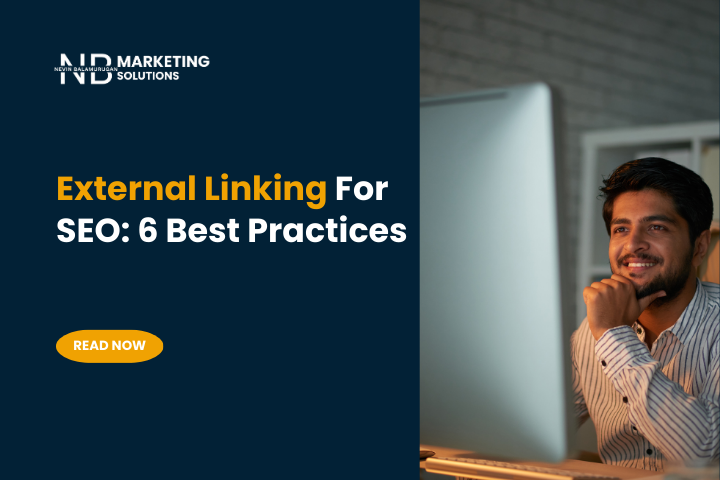External Linking For SEO: 6 Best Practices You Need To Follow
Nevin Balamurugan
August 20, 2025

External Linking For SEO (With Best Practices)
External linking for SEO is one of the top-ranking factors that Google considers when showing results on the search engine result pages (SERPs). It is a powerful way to enhance your website’s visibility on search engines.
External links are a good sign for search engines to say, “Okay, this site is connecting to some quality content – so it must be valuable too!”.
But many marketers either neglect this crucial element or fail to utilize it effectively. If you are making the same mistake, you’re missing out on your brand visibility in Google.
So, it’s essential to learn how to utilize external linking for SEO purposes. Here, we’ll discuss what external linking is and why it’s important, and some best practices you should follow to improve your ranking and brand visibility in Google.

What is External Linking For SEO?
External linking (also known as outbound links) is the practice of adding hyperlinks on your website that direct customers to pages on other websites. This helps search engines understand your site’s relevance and also improves user experience, which provides additional value.
Unlike internal links, which connect pages within the same site, external links guide both search engines and customers to additional valuable resources and information outside your domain.
When done strategically, external linking can strengthen your SEO and contribute to achieving higher search rankings.
When Should You Use External Linking For SEO?
External links are hyperlinks that direct visitors to a website other than your domain. This may seem countermove – directing visitors away from your site. But external linking for SEO helps to boost your site’s credibility and authority.
Search engines view external links as signals of trust. By linking to reputable, high-quality sources, you demonstrate that your content is well-researched. This enhances your site’s relevance and builds trust, showing that you care about providing them with the most accurate and useful information.
You should use external links in situations such as:
- When citing data, statistics, or research studies to support your claims.
- When referencing industry experts, government sites, or authoritative publications.
- When directing readers to tools, guides, or resources that add value to your content.
Here Are The Benefits of Using External Linking For SEO
When external linking for SEO is done strategically, it offers several benefits that boost your brand reputation. Let’s break it down.
1. External linking improves your credibility
When you refer to a reliable source, you’re providing your readers with valuable information. By pointing them to trustworthy and relevant sites, you make your content more believable. This improves your website’s credibility and authority.
2. External linking improves your SEO performance
When your content includes external links, search engines determine that your content is useful and well-connected. High-quality websites tend to link to each other, so when you follow this practice, search engines are more likely to see your pages as valuable and rank them higher.
3. External linking creates a connection
Other website owners notice when you mention and link to their content, and some may return the favor by linking back to your site. This is a simple way to build relationships within your industry, which is great because more high-quality backlinks can give your content more visibility.
4. External linking encourages repeat visits
When readers find that you consistently recommend quality resources, they’re more likely to return to your site for future information. Over time, this loyalty can turn visitors into customers who trust your recommendations.
5. External linking adds value
External linking provides a better user experience. This allows visitors to explore related topics in more detail or verify the information you’ve shared. When customers see that you consistently link out to sites that’d help them understand a topic better, they’ll associate with your website.
External Linking For SEO: Best Practices You Need To Follow
Google has made it clear that links play a huge role in ranking higher at #1 in the SERPs. When used strategically, external links can boost your authority, improve user experience, and help search engines better understand your content.
Let’s look at some external linking for SEO best practices you need to keep in mind.
1. Keep your external links relevant to your content
One of the biggest mistakes marketers make with external linking is adding random links just to have them. This doesn’t help your visitors, and it doesn’t help your SEO either. Instead, focus on linking to content that adds value to what you’re writing about.
For example, if you’re sharing a blog about digital marketing trends, you could link to recent industry updates, videos, or infographics that provide deeper insights. These kinds of resources enrich your content and give readers additional information.
Search engines value users and provide them with the most relevant results for their keyword. So, when external links come from websites in the same niche, the search engine understands the relevance of your content and leads your webpage to a higher SERP ranking.
2. Open external links in a new tab
Whenever you add an external link, make sure it opens in a new tab. It gives your audience more control over their browsing experience. By opening a new tab, readers can explore the resource you’re linking to without completely leaving your site. This way, your page stays open in the background, making it easier for them to return and continue reading.
3. Link to reputable sources
When using external linking, only link to sites that are credible, authoritative, and genuinely useful. This instantly boosts your credibility.
On the other side, if you link to websites that promote clickbait content, poorly researched, or spammy content, you’ll lose your audience’s trust – and search engines may see your content as less reliable.
If you have no choice but need to reference a website you don’t fully trust – use a no-follow tag. This indicates to search engines that the linked webpage shouldn’t be associated with your page, but still serve your readers with extra information.

4. Use anchor text in a correct way
Anchor text (clickable words that carry with link) is one of the important factors for external linking for SEO for both readers and search engines. When done right, it helps visitors understand where the link will take them and gives search engines valuable context about the linked page.
Let’s look at a quick example. Imagine you’ve written a blog post about how to do keyword research for SEO and want to link Google Ads Keyword Planner guide on the same topic. If your link looks like this:
You can click here to read the article.
The word “here” becomes the anchor text for the link. But this single word doesn’t tell what the link is about, and Google can’t notice whether it’s related to your content or not. So, now let’s give Google a very little hint about the content in a descriptive way.
We’ve got a previous article that explains how to use Google Ads Keyword Planner to find keywords for SEO.
This version is much more effective. Why? Because the anchor text tells both the readers and search engines exactly what the linked page is about.
Here are a few best practices to keep in mind when writing anchor text:
- Be descriptive and relevant: Use keywords or phrases that reflect what the linked page covers.
- Keep it natural: Anchor text should flow smoothly within the sentence.
- Avoid generic phrases: Words like “click here” or “read more” add no value to readers or search engines.
- Don’t over-optimize: Repeating exact-match keywords in every link can look spammy.
5. Don’t link your webpage to competing websites
When it comes to external linking, you need to be strategic about who you link to. Sending readers to websites that directly compete with you for the same keywords can hurt your SEO efforts. For example, if you’re trying to rank for “best toys for cats,” you shouldn’t link to a site that already dominates the #1 spot for that exact keyword.
Instead, look for external resources that add genuine value to your content without threatening your rankings. Using the same example, “best toys for cats”, you could point readers to a YouTube video demonstrating how a specific cat toy works, or to a veterinary association’s article on what makes a toy safe for pets.
6. Add only helpful links that are related to your content
One of the most common questions marketers have about external linking is:
How many links should I include in my content?
Google doesn’t set a strict limit, but what matters most is how useful those links are to your readers. Every link you add should serve a clear purpose – whether that’s giving your audience extra context, pointing them to data that supports your claims, or helping them provide additional information.
Try Out To Build Your External Linking Strategy For SEO
External linking for SEO provides additional information to your visitors while building your website’s authority. When done right, external linking can even boost your ranking on the SERP.
So, now is the time to implement all these strategies you’ve learned from this article. If you have any doubts regarding external linking and want help with SEO, contact NB Marketing Solutions. Our SEO experts handle your website problems with sufficient care.
So, contact us today for digital marketing services!
Recent Posts
Have Any Question?
- (+91) 938-542-1049
- info@nbmarketingsolutions.in
Categories
Make Appointment
Confused Over Choosing The Right Services For Your Business?
Tamil Nadu, India
- Near TMB Bank, Anjugramam post, Kanyakumari 629401
- info@nbmarketingsolutions.in
- (+91)93-8542-1049
